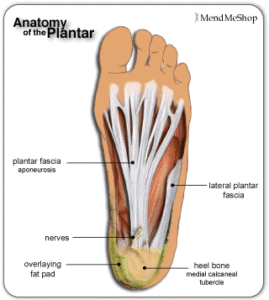Plantar fascia is a thick connective tissue extending from calcaneal to metatarsal heads. It has 3 bands: lateral, medial, and central.

Source: http://theuniquetouchmassage.massagetherapy.com/plantar-fasciitis-anatomy.gif
The plantar fascia has a static and dynamic purpose whereby the static is to support arch foot in weight bearing. The dynamic purpose is to elongate and elevate the medial arch which is also known as the windlass mechanism (elevate the medial arch with dorsiflexion of big toe).
What is Plantar Fasciopathy?
Plantar fasciopathy is a foot condition that is primarily due to repetitive micro tears of the plantar fascia similar to tendinosis or tendinopathy. The term plantar faciitis is more appropriate for the acute, inflammatory phase but most clinicians have been using it for acute and chronic phase. There are 2 Phases of damage:
- Inflammation phase, which has acute symptoms
- Degeneration phase which is the chronic stages
The inflammation and tearing commonly occur near the origin of the central band at the medial calcaneus (the heel area). It is believed to be due to poor foot biomechanics that stress the plantar facia. Flat feet or weak foot arch muscles are the common causes of this condition. Patients usually experience tenderness around the heel and arch area. There also may be pain with standing on the toes or bending toes backwards. An increase in weight, age or activity levels could increase the risk of plantar fasciopathy.
How is it managed?
This condition is most commonly treated with stretching, strengthening exercises, ultrasound, strapping, orthotics, night splints and joint mobilisation. Plantar fascia and calf stretches has been shown to be effective whereby the improvements of symptoms persisted for months (Rompe et al., 2010). Therefore, night splints could be beneficial in some individuals as there is a constant stretch of the plantar fascia.
Furthermore, orthotics were found to improve pain and function in conjunction with exercises for those in the acute or chronic stage. Strapping whether with rigid or kinesio tape has a positive short –term effect for plantar fasciopathy. However, these interventions combinations and techniques has to be modified according to each individual patient. A good thorough subjective and objective assessment would be required to treat this condition effectively.
By: Sarah Kew


